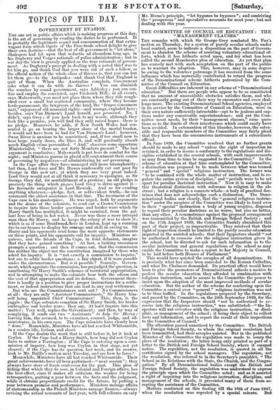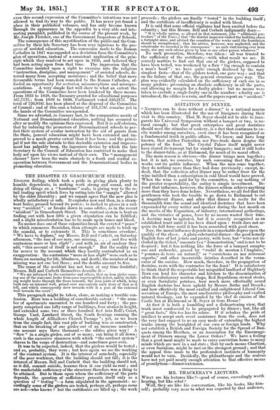THE COMMITTEE OF COUNCIL ON EDUCATION : THE " MANAGEMENT
CLAUSES."
ME remarks with which Sir George Grey combated Mr. Fox's motion on Thursday, for a system of purely secular schools under local control, seem to indicate a disposition on the part of Govern- ment to abandon the scheme of assisting voluntary educational ef- forts, which it has hitherto acted upon, and try what has been called the second Manchester plan of education. As yet that plan has scarcely met with such acceptation on the part of the public as to warrant its adoption. This, however, may in some degree be owing to the volunteer patronage it has received from the same influence which has materially contributed to retard the progress of the Denominational scheme hitherto patronized by the Com- mittee of the Council on Education.
Great difficulties are inherent in any scheme of "Denominational education." But there are people who appear to be so constituted that no amount of unavoidable obstacles satisfies them, and who are constantly going out of their way to encounter and even chal- lenge more. The existing Denominational School agencies, employed in its service by the Committee of Council on Education, were in their own nature sufficiently intractable—apt to be jealous and cap- tious under any conceivable superintendence ; and yet the Com- mittee must needs, by their "management clauses,' raise ques- tions as to the limits of their interference which could easily have been avoided. In extenuation of this blunder, however, the osten- sible and responsible members of the Committee may fairly plead that they have been the unconscious instruments of a subordinate official.
In June 1839, the Committee resolved that no further grants should be made to any school "unless the right of inspection be retained, in order to secure a conformity to the regulations and dis- cipline established in the several schools, with such improvements as may from time to time be suggested to the Committee." In the scheme of education at that time contemplated by the Committee, a distinction was proposed to be made between what was termed "general" and "special" religious instruction. The former was " to be combined with the whole matter of instruction, and to re- gulate the entire system of discipline," and "periods were to be set apart for peculiar doctrinal instruction." Now it is easy to make this theoretical distinction with reference to religion in the ab- stract ; but a religion is a concrete whole—a body of practical doc- trines that does not acknowledge such a distinction. The Deno- minational bodies saw clearly, that the "general religious instruc- tion" under the auspices of the Committee was likely to hand over to their "special" instruction a body of young sceptics, disposed to regard their peculiar doctrines as no worse, bat also no better, than any other. A remonstrance against the proposed arrangement was transmitted by the British and Foreign School Society ; and on the 17th August 1839, the Committee frankly abandoned this part of their project, as impracticable. They resolved that their right: ofinspection should be limited to the purely secular education imparted in the assisted schools; that their In-spectors should "not be authorized to examine into the religions-instruction given in the school, but be directed to ask for such information as to the secular instruction and general regulations of the school as may enable the Committee to niake a report to her Majesty in. Council, to be laid before both Houses of Parliament."
This would have quieted the scruples of all denominations. It is precisely what has since been conceded to the Roman Catholics, and what Dr. Chalmers demanded. Its practical effect would have been to give the promoters of Denominational schools a motive to perfect the secular education they afforded in combination with religious instruction, and to secure to the Committee the power to insist upon the adoption of the most improved methods of secular education. But the author of the scheme for conferring upon the Committee a control over " general " religions instruction was not to be thus baffled. In the regulations prepared by the Secretary, and passed by the Committee, on the 24th September 1839, for the expression that the Inspectors should "not be authorized to ex- amine into the religious instruction," was substituted—" the In- spectors will not interfere with the religious instruction, or disci- Face, or management of the school ; it being their object to collect facts and information, and to report the result of their inspections to the Committee of Council."
The alteration passed unnoticed by the Committee. The British and Foreign School Society, to whom the original resolution had been transmitted, had their scruples quieted. But in the published Minutes of the Committee the regulation was made to usurp the place of the resolution ; the latter being only printed as part of a letter to the British_ and Foreign School Society, where it escaped notice. The regi4tion, not the resolution, is quoted in all the certificates signed by the school managers. The regulation, not the resolution, Was referred to in the Secretary's'peniphkt, " The School in its Relations with the State, the Church, and the Congre- gation." By all Denominational bodies except the British and Foreign School Society, the regulation was understood to express the principle upon which the Committee acted ; and as it asserted a right of inquiring into the religious instruction, discipline, and management of the schools, it prevented many of them from ac- cepting the assistance of the Committee.
-Matters continued on this footing till the 10th of June 1817; when the resolution was repeated by a special minute. But'
even this second expression of the Committee's intentions was not allowed to find its way to the public. It has never yet found a place in their published volumes, and has only become known through its appearance in the appendix to a very able and inte- resting pamphlet, published in the course of the present week, by Mr. Joseph Fletcher, one of the Government Inspectors of Schools.
The consequence of this mystification of the public and the Com- mittee by their late Secretary has been very injurious to the pro- gress of assisted education. The concession made to the Roman Catholics in 1847 was regarded as a deviation from the Committee's plan of operations, instead of a consistent application of the prin- ciple which they resolved to act upon in 1839, and believed they had been acting upon from that time. The impression that the Committee insisted upon, a right to examine into the religious " instruction, discipline, and management" of assisted schools, de- terred many from accepting assistance ; and the belief that more favourable terms had been conceded to the Roman Catholics, af- forded an opportunity for sectarian misconceptions and misrepre- sentations. A very simple fact will show to what an extent the operations of the Committee have been hindered by these means. From 1833 to 1838, the Treasury granted for educational purposes 167,717/. ; from 1839 to 1850, Parliament voted 559,2171. The total of 726,934/. has been placed at the disposal of the Committee of Council ; and of this sum a balance of 251,178/. remains yet in the hands of the Committee unexpended. Since we adverted, in January last, to the comparative merits of National and Denominational education, nothing has occurred to alter or modify the opinions then expressed. But it is self-obvious, that by inducing the promoters of Denominational schools to per- fect their system of secular instruction by the aid of grants from the State, general education might have been extended and im- proved to a much greater extent than it has been : and the princi- pal if not the sole obstacle to this desirable extension and improve- ment has palpably been, the ingenious device by which the late Secretary to the Council of Education has contrived to make that body act upon his views instead of their own. The " management clauses" have been the main obstacle to a frank and cordial co- operation between Government and the Denominational bodies in promoting education.



























 Previous page
Previous page